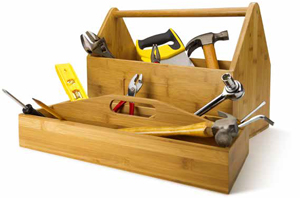Introduction
 From carpenters to artists and writers to gardeners, the essential tools found in a toolkit are designed to help build or achieve an important goal. Tools include not only helpful equipment, but information and/or instructions as well. For example, a carpenter needs tools, materials, and a blueprint, for building a structure… and for a gardener, common tools include a spade, rake, and a watering can for growing flowers.
From carpenters to artists and writers to gardeners, the essential tools found in a toolkit are designed to help build or achieve an important goal. Tools include not only helpful equipment, but information and/or instructions as well. For example, a carpenter needs tools, materials, and a blueprint, for building a structure… and for a gardener, common tools include a spade, rake, and a watering can for growing flowers.
In this case, the goal is to better recognize MS relapses, their treatments, and their impact on daily life. The tools in this MS Relapse Toolkit include useful information, treatment descriptions, and forms to complete. With these tools, you’ll be able to build a more thorough understanding of MS relapses, which will help you to know what to expect, reduce anxiety, and prepare for the possibility of a relapse in the future.
The MS Relapse Toolkit includes:
- Informative details on relapses and symptoms
- Important checklists to share with your doctor and family
- What to discuss with your healthcare team
- Planning ahead for a possible relapse
- FDA-approved and experimental treatment options
- Crossword puzzle with relapse-related terminology
 The authors of this toolkit hope that you find the information to be useful in helping you to manage your MS relapses. Knowing what to expect, how to plan ahead, and having information ready for your neurologist will avoid the confusion and last-minute scrambling to accommodate the temporary – but often very significant – changes in symptoms during a flare-up of one’s MS.
The authors of this toolkit hope that you find the information to be useful in helping you to manage your MS relapses. Knowing what to expect, how to plan ahead, and having information ready for your neurologist will avoid the confusion and last-minute scrambling to accommodate the temporary – but often very significant – changes in symptoms during a flare-up of one’s MS.
For additional information about MS relapses, treatments, and helpful resources, please visit MSAA’s online MS Relapse Resource Center at relapses.mymsaa.org. For general information about MS – including important details on disease-modifying therapies, symptom management, wellness strategies, research news, and more – please visit mymsaa.org.
